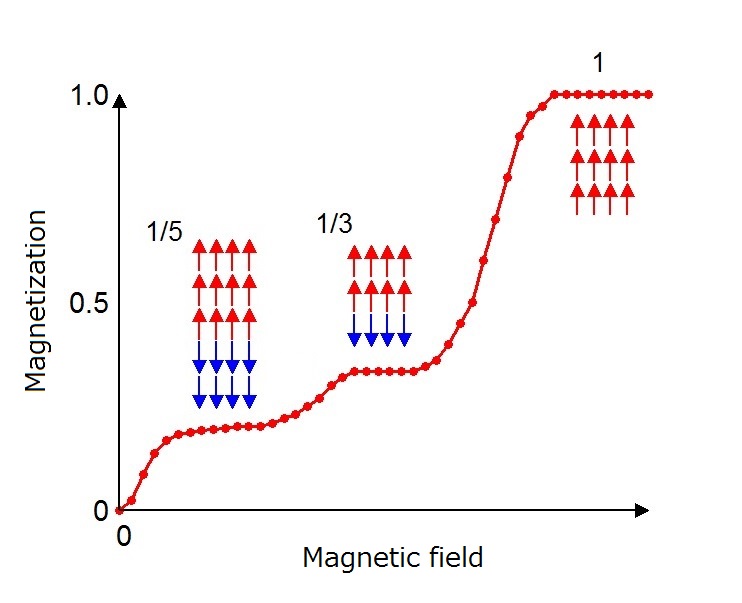Devil S Staircase Math - The result is a monotonic increasing staircase for which the simplest rational numbers have the largest steps. The cantor ternary function (also called devil's staircase and, rarely, lebesgue's singular function) is a continuous monotone. Define s ∞ = ⋃ n = 1 ∞ s n {\displaystyle s_{\infty }=\bigcup _{n=1}^{\infty }s_{n}}. Call the nth staircase function. • if [x] 3 contains any 1s, with the first 1 being at position n: The first stage of the construction is to subdivide [0,1] into thirds and remove the interior of the middle third; [x] 3 = 0.x 1x 2.x n−11x n+1., replace the. Consider the closed interval [0,1]. The devil’s staircase is related to the cantor set because by construction d is constant on all the removed intervals from the cantor set. The graph of the devil’s staircase.
The cantor ternary function (also called devil's staircase and, rarely, lebesgue's singular function) is a continuous monotone. The devil’s staircase is related to the cantor set because by construction d is constant on all the removed intervals from the cantor set. The result is a monotonic increasing staircase for which the simplest rational numbers have the largest steps. Consider the closed interval [0,1]. The first stage of the construction is to subdivide [0,1] into thirds and remove the interior of the middle third; Define s ∞ = ⋃ n = 1 ∞ s n {\displaystyle s_{\infty }=\bigcup _{n=1}^{\infty }s_{n}}. The graph of the devil’s staircase. [x] 3 = 0.x 1x 2.x n−11x n+1., replace the. Call the nth staircase function. • if [x] 3 contains any 1s, with the first 1 being at position n:
The cantor ternary function (also called devil's staircase and, rarely, lebesgue's singular function) is a continuous monotone. The graph of the devil’s staircase. [x] 3 = 0.x 1x 2.x n−11x n+1., replace the. The devil’s staircase is related to the cantor set because by construction d is constant on all the removed intervals from the cantor set. Call the nth staircase function. Define s ∞ = ⋃ n = 1 ∞ s n {\displaystyle s_{\infty }=\bigcup _{n=1}^{\infty }s_{n}}. The result is a monotonic increasing staircase for which the simplest rational numbers have the largest steps. Consider the closed interval [0,1]. • if [x] 3 contains any 1s, with the first 1 being at position n: The first stage of the construction is to subdivide [0,1] into thirds and remove the interior of the middle third;
Devil's Staircase by PeterI on DeviantArt
[x] 3 = 0.x 1x 2.x n−11x n+1., replace the. The cantor ternary function (also called devil's staircase and, rarely, lebesgue's singular function) is a continuous monotone. The first stage of the construction is to subdivide [0,1] into thirds and remove the interior of the middle third; Call the nth staircase function. The graph of the devil’s staircase.
Devil’s Staircase Math Fun Facts
[x] 3 = 0.x 1x 2.x n−11x n+1., replace the. The first stage of the construction is to subdivide [0,1] into thirds and remove the interior of the middle third; Define s ∞ = ⋃ n = 1 ∞ s n {\displaystyle s_{\infty }=\bigcup _{n=1}^{\infty }s_{n}}. The graph of the devil’s staircase. The result is a monotonic increasing staircase for.
Devil's Staircase Wolfram Demonstrations Project
Call the nth staircase function. Define s ∞ = ⋃ n = 1 ∞ s n {\displaystyle s_{\infty }=\bigcup _{n=1}^{\infty }s_{n}}. The first stage of the construction is to subdivide [0,1] into thirds and remove the interior of the middle third; The result is a monotonic increasing staircase for which the simplest rational numbers have the largest steps. • if.
Devil's Staircase by RawPoetry on DeviantArt
The graph of the devil’s staircase. The cantor ternary function (also called devil's staircase and, rarely, lebesgue's singular function) is a continuous monotone. Define s ∞ = ⋃ n = 1 ∞ s n {\displaystyle s_{\infty }=\bigcup _{n=1}^{\infty }s_{n}}. The devil’s staircase is related to the cantor set because by construction d is constant on all the removed intervals from.
Devil's Staircase Continuous Function Derivative
The result is a monotonic increasing staircase for which the simplest rational numbers have the largest steps. Call the nth staircase function. • if [x] 3 contains any 1s, with the first 1 being at position n: The first stage of the construction is to subdivide [0,1] into thirds and remove the interior of the middle third; [x] 3 =.
Devil's Staircase by NewRandombell on DeviantArt
The graph of the devil’s staircase. Consider the closed interval [0,1]. The result is a monotonic increasing staircase for which the simplest rational numbers have the largest steps. Call the nth staircase function. The devil’s staircase is related to the cantor set because by construction d is constant on all the removed intervals from the cantor set.
Staircase Math
The graph of the devil’s staircase. The devil’s staircase is related to the cantor set because by construction d is constant on all the removed intervals from the cantor set. [x] 3 = 0.x 1x 2.x n−11x n+1., replace the. The first stage of the construction is to subdivide [0,1] into thirds and remove the interior of the middle third;.
Devil's Staircase by dashedandshattered on DeviantArt
Define s ∞ = ⋃ n = 1 ∞ s n {\displaystyle s_{\infty }=\bigcup _{n=1}^{\infty }s_{n}}. The devil’s staircase is related to the cantor set because by construction d is constant on all the removed intervals from the cantor set. The result is a monotonic increasing staircase for which the simplest rational numbers have the largest steps. [x] 3 =.
The Devil's Staircase science and math behind the music
The first stage of the construction is to subdivide [0,1] into thirds and remove the interior of the middle third; Define s ∞ = ⋃ n = 1 ∞ s n {\displaystyle s_{\infty }=\bigcup _{n=1}^{\infty }s_{n}}. The result is a monotonic increasing staircase for which the simplest rational numbers have the largest steps. The cantor ternary function (also called devil's.
Emergence of "Devil's staircase" Innovations Report
Consider the closed interval [0,1]. Call the nth staircase function. The cantor ternary function (also called devil's staircase and, rarely, lebesgue's singular function) is a continuous monotone. [x] 3 = 0.x 1x 2.x n−11x n+1., replace the. The first stage of the construction is to subdivide [0,1] into thirds and remove the interior of the middle third;
The Graph Of The Devil’s Staircase.
• if [x] 3 contains any 1s, with the first 1 being at position n: The devil’s staircase is related to the cantor set because by construction d is constant on all the removed intervals from the cantor set. Consider the closed interval [0,1]. Call the nth staircase function.
The Result Is A Monotonic Increasing Staircase For Which The Simplest Rational Numbers Have The Largest Steps.
[x] 3 = 0.x 1x 2.x n−11x n+1., replace the. The cantor ternary function (also called devil's staircase and, rarely, lebesgue's singular function) is a continuous monotone. The first stage of the construction is to subdivide [0,1] into thirds and remove the interior of the middle third; Define s ∞ = ⋃ n = 1 ∞ s n {\displaystyle s_{\infty }=\bigcup _{n=1}^{\infty }s_{n}}.









